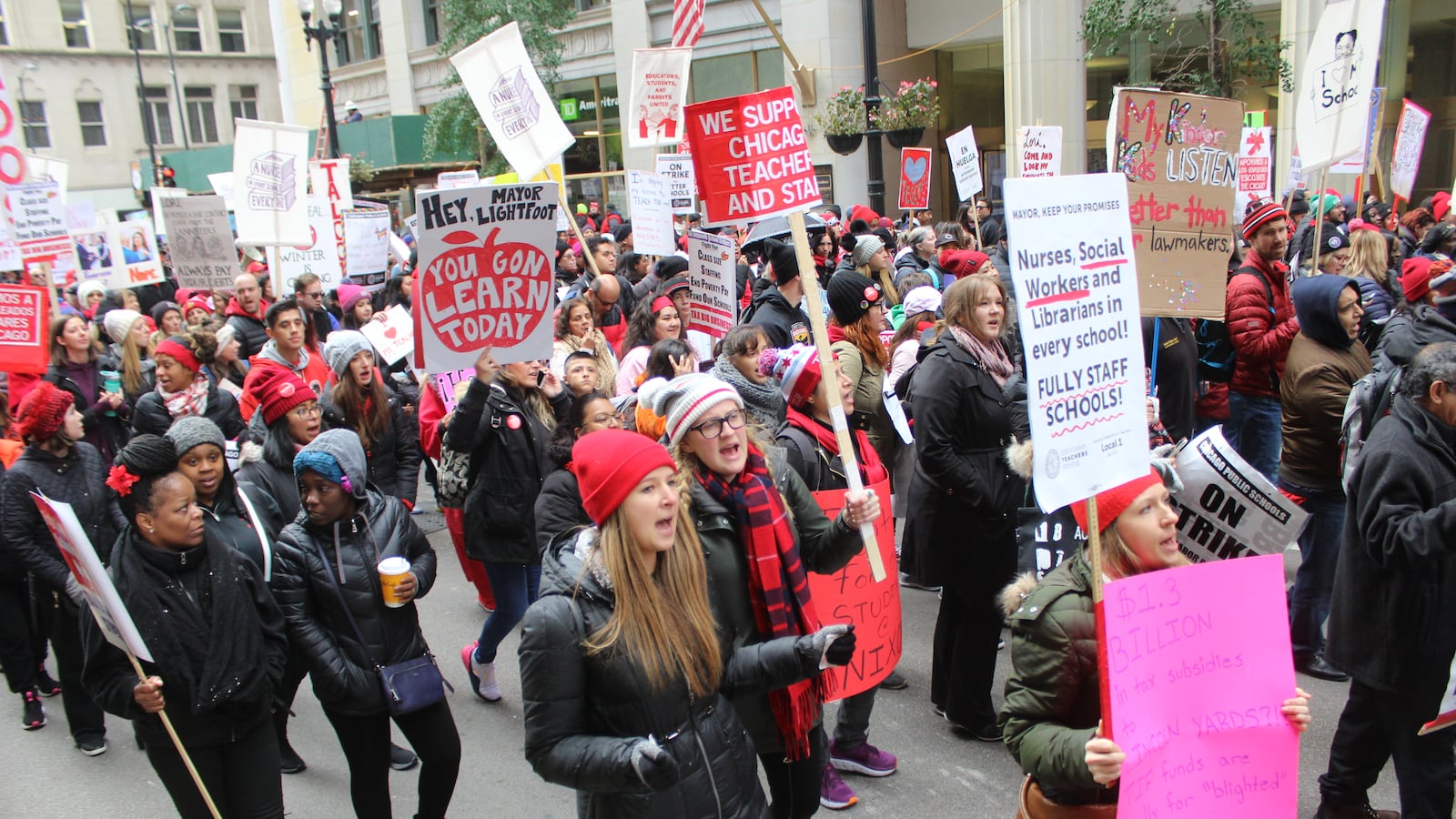With pressure mounting on both City Hall and the Chicago Teachers Union to reach a deal so that 300,000 children can return to school, both sides Wednesday agreed the sticking point isn’t policy. It’s how much the city is willing to spend.
Hopes appear to dim for reaching any resolution by the end of the week.
“I have no idea when the strike will end,” Mayor Lori Lightfoot told the Crain’s Chicago Business editorial board Wednesday afternoon, just hours after she confidently delivered her first budget address in City Council chambers and detailed how she plans to plug a $838 million hole in the city budget.
In a tour of editorial boards Wednesday, Lightfoot stressed that neither the city nor the school system, which have separate budgets, can afford to squeeze out more money to meet union demands. She has pegged the city’s concessions so far at an additional $500 million across five years, and she has said she wants to hold the line there, while estimating the union’s total demands would cost the city nearly $2.4 billion.
“They are going to have to live within their means,” she has said repeatedly.
Leaders of the teachers union, meanwhile, don’t see the resources the same way. They said Wednesday they weren’t satisfied with an additional $66 million in additional tax-increment funds that the city announced Wednesday for schools. (The mayor’s budget directs $163.1 million to schools from the TIF surplus, but $97 million was already budgeted for use this school year.)
Related: The school system’s lowest paid workers are on strike, too, in Chicago
“Today the mayor delivered an address of austerity, while announcing a record TIF that the city promptly took back from us,” union Vice President Stacy Davis Gates said. “While she celebrates this record surplus, we won’t see it in our classrooms, because we are paying for things the city paid for last year.” Gates was referring to such shared costs as school police, which are coming out of the Chicago Public Schools budget for the first time this school year.
But negotiators made some progress, even while the union planned to ramp up its daily actions on Thursday with a civil disobedience training for its members. President Jesse Sharkey described momentum on smaller issues such as teacher evaluations and translation services. However, resolving five core issues — class size, support staffing, pay, prep time, and the length of the contract — remains elusive.
According to Sharkey, negotiators have largely agreed on staffing targets for additional nurses and social workers; what remains is a way to ensure the city delivers on its hiring promises. The teams are still far apart over teacher prep time.
On class size, an issue that teachers on picket lines speak frequently and passionately about, Sharkey said the two sides had agreed to prioritize high-need schools first. But they disagree over how much money could be set aside to provide relief, most likely in the form of teachers aides, and how the district would enforce measures to ease overcrowding.
“It’s an expensive demand,” he said of the union’s initial ask to lower class size to 20 in kindergarten and 24 in first through fifth grades. “We understand if we can’t fully get our demand, but I can’t bring back to our members and say here’s a few thousand dollars for your high school,” referencing a $9 million proposed budget for a class size committee that would have authority to relieve overcrowding. Of that, only $700,000 would be set aside to relieve overcrowding across 86 high schools, according to the union.
In her editorial board appearances Wednesday, Lightfoot said that the Chicago Teachers Union bargaining team was just too big and too slow. “There is some progress being made but not enough — and not fast enough,” noting that the union’s team has more than 40 people on it, and its size is an impediment to negotiating efficiently.
In 30 years practicing law, she said, “I’ve never experienced something where you have such a large bargaining team on the other side. Even in complicated transactions, there is a chain of command and somebody who really sets a course on the other side for how counterproposals go back and forth.”
In the current negotiations, she said the union spends most of its time in caucuses with its members, reviewing proposals.
“They need to have a seriousness of purpose and an urgency—especially when we’re in Day Five of a strike,” she told editors at Crain’s. “I bear the weight of those children who are stressed out, the parents who are worrying and wringing hands about when the strike is going to end.“
In response, Sharkey said Wednesday that the union had readied its proposal for the city 10 months ago, but discussion began only in recent weeks. “Why weren’t the discussions more serious weeks ago?” he asked.

